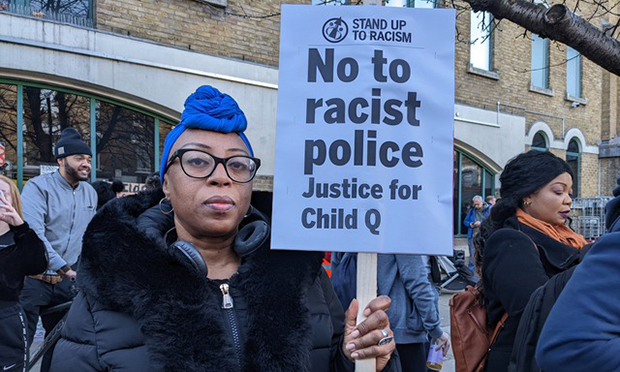Child Q: Police watchdog completes investigation into officers involved in strip-search – but disciplinary action yet to be decided

The teenage girl’s treatment sparked protests in the borough. Photograph: Julia Gregory
A lengthy inquest into alleged misconduct by police officers who strip-searched a Black teenage girl at her Hackney school has now been completed, it can be revealed – but potential disciplinary action is still to be decided.
The Independent Office for Police Conduct (IOPC) previously warned the four officers that they were being investigated on suspicion of gross misconduct.
The watchdog will share its findings with all those involved before it announces its decision, and a report into its investigation will not be released until any disciplinary hearings have finished.
News that the IOPC’s probe is over comes hot on the heels of a new progress report on the Child Q scandal by Hackney’s independent safeguarding commissioner Jim Gamble.
Gamble revealed that he was told recently by Child Q that the strip-search “remains a weight on her shoulders”.
His report covers changes that have been made in the 14 months since the scandal broke, and recommendations for further action.
He said there have been “positive dividends” from a new trust and confidence group that has participants from community groups, the council and police.
These include new regular meetings between the Foster Carers Council and police youth engagement, after years of people trying to build this relationship.
“Whilst perhaps a small step, small steps can be good steps,” Gamble said.
Other progress includes “stronger relationships” between community groups and police safer neighbourhoods teams, which has led to a better understanding of stop-and-search powers.
But Gamble said Metropolitan Police Commissioner Sir Mark Rowley needs to accept the findings of this year’s Casey Report, which said the force is blighted by “institutional racism”.
His other recommendations include children playing a part in selecting safer schools officers.
Some children told the safeguarding expert about school officers “who appeared distant, authoritarian, and passively aggressive”.
Hackney’s new borough commander James Conway said that, for many residents, what happened to Child Q “compounded feelings of being over-policed and under-protected”.
He said it was a priority to tackle this “as we seek to rebuild trust and confidence”.
In an open letter to residents, he apologised for what happened to the 15-year-old and welcomed Gamble’s recommendation for a “child-centred” approach.
He wrote: “I am sorry for the trauma that we caused a child and reiterate that their experience should never have happened.”
He added that searches are an “important tactic” in combatting violence and use of weapons, but that police had to be “particularly careful and proportionate” when they involve children.
Progress has been made, he said, with tougher oversight from senior officers and the presence of an appropriate adult.
Hackney anti-racism campaigner Sasha Simic pointed out that the Home Secretary recently told police to “ramp up” searches, and said: “We know this affects Black kids.”
He said the investigation into what happened at a Hackney school three years ago “is one tiny fragment of a police force that can’t be trusted”.
In his message, Det Chief Supt Conway said “history shapes public trust and confidence in the police today, and poor experiences can create a sense of trauma which fans out through the community and is passed down through the generations”.
He told residents that the force is “absolutely committed to turning the police around to be anti-rascist, anti-sexist and anti-homophobic”.
Hackney Council is currently recruiting for a new policing scrutiny panel.
It used to have a police committee in the 1980s, and this time the council want “people with a keen interest in holding the police to account for their use of stop and search and other police powers to ensure that policing in Hackney is fair to all communities”.
It is also looking for people from the communities who are “most frequently stopped and searched”.
